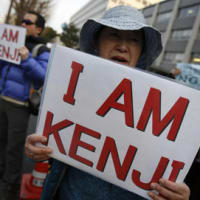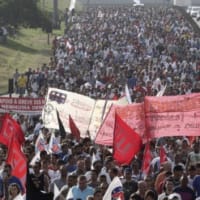Debate Erupts Over Legality Of Awlaki's Killing
アウラキ殺害の合法性についての論争が勃発
法的な解釈は難しい!
by Carrie Johnson
September 30, 2011

Anonymous/AP
U.S.-born cleric Anwar al-Awlaki was killed Friday in a U.S. airstrike in Yemen. U.S. officials say he was linked to several major terrorist plots in recent years. 米国生まれの牧師アンワル・アウラキは金曜日に、イエメンにおける米軍の航空攻撃で殺害された。米国関係者によると、ここ数年の主要なテロの計画に彼は関与していたという。
Within moments of Anwar al-Awlaki's death, debate erupted over whether the U.S. had a legal basis to target one of its own citizens with deadly force.
Last year, President Obama put Awlaki on a secret list that gave the intelligence community a green light to target him in a deadly drone attack.
アンワル・アル‐アウラキの死後すぐに、米国が自国の市民を殺戮兵器の目標とすることが法的に許されるのかという議論が起きた。 昨年、オバマ大統領は情報組織に与えた極秘リストにアウラキの名前を入れ、彼を無人機攻撃の攻撃目標とすることに許可を与えた。
The move bothered human-rights advocates so much that they sued, enlisting Awlaki's father as a plaintiff in the lawsuit.
この動きは人権団体を狼狽させ、彼らはアウラキの父親を訴訟事件の原告として告訴した。
"The government should not have the unreviewable authority to carry out the targeted killing of any American, anywhere, whom the president deems to be a threat to the nation," says Hina Shamsi, who leads the national security project at the American Civil Liberties Union.
「政府は、どこにおいても大統領が国家に脅威だと考えるアメリカ国民を殺害目標として、これを遂行することについて、再考の留保がつかない権限を持つべきではない」とアメリカ公民権連合(ACLU)で国家安全保障プロジェクトを主導するヒナ・シャムシは訴える。
But the Justice Department responded that Awlaki wasn't just any American. He transformed himself from a cleric who inspired young Muslims with words to an operational leader who helped equip terrorist plotters with deadly bombs.
しかし、司法省は、アウラキは米国民ではなかったと対応した。彼は、彼自身、言葉で若いムスリムに思想を吹き込んだ聖職者から、殺傷の為の爆弾でテロリストの企みを助けた、テロ作戦の指導者へ変質してしまった。
A judge ultimately threw out the ACLU lawsuit, saying it involved state secrets and raised political questions that should be answered in Congress, not the courts.
裁判所は最終的に、これは国家機密に属し、政治的な問題を提起するため、それらは法廷ではなく議会で扱われるべきだとして、このACLUの訴えを退けた。
All those questions came roaring back again today with word of Awlaki's death at the hands of the U.S. government.
これらの問題は、米国政府の手によるアウラキの死という言葉で、今日再び蒸し返された。
"The requirements of the Constitution with respect to due process for killing an American are not clear," says John Bellinger, a lawyer in the State Department under President George W. Bush.
ジョージ・ブッシュ大統領のもとで国務省の法律担当弁護士であったジョン・べぃんがーは「アメリカ国民を殺害する正当な手続きについて憲法の要請するところは明確ではない。」と話している。
After 10 years of talking about legal authority when it comes to terrorism, he says, there's still no international consensus on the legality of drone strikes — and no clear precedent for using those drones to kill a U.S. citizen.
テロリズムのことになると、法的な権威について10年間話されてきて、いまだに、無人機の攻撃の合法性については国際的なコンセンサスに至っていない。 ・・・さらにアメリカ市民を殺害するために、これらの無人機を使うというハッキリした前例もないと彼は話す。
"Wherever they are in the world, they have a constitutional right to due process," Bellinger says. "But due process doesn't necessarily mean an adversarial judicial hearing."
「世界中のどこであろうと、憲法上の正しいプロセスは踏まれなければならないが、それが反対の審問を必ずしも意味しない。」とべリンガーは言う。
So, Bellinger says, under his view of the law, a criminal trial or even an indictment doesn't have to happen to satisfy the Constitution.
べリンガーの法律の見解では、刑事裁判或いは起訴ですら憲法を満足しないこともありうる」というもの。
Instead, a legal finding by the Justice Department and debate among lawyers from multiple government agencies might have satisfied Awlaki's rights under the Fifth Amendment.
司法省の法解釈と多数の政府当局の法律家の議論はアウラキの黙秘権を満足させたかも知れない。
Ken Anderson, who teaches at American University's Washington College of Law and follows U.S. policy on drones, says the analysis starts with whether Awlaki amounted to a lawful target — U.S. citizen or not.
アメリカン・ユニバーシティのワシントン法科大学院で米国の無人機政策について教鞭をとるケン・アンダーソンは、分析はまずアウラキが合法的目標たりうるか・・・・アメリカ市民か否かから始めると言う。
"The U.S has always seen somebody who is planning attacks against the United States as a lawful target," Anderson says.
「米国は合衆国に対して攻撃を企てるものは誰でも、合法的な攻撃目標であると常に見てきた」とアンダーソン氏は言う。
Either because Awlaki presented an imminent threat to American citizens or because he had become an enemy fighting alongside al-Qaida in the Arabian Peninsula, Anderson says, he could be seen as a lawful target.
アウラキがアメリカ市民に対する切迫した脅威となっていること、彼がアラブ半島においてアルカイダと共に戦い米国の敵になっていること、これらいずれの理由においても彼は合法的な攻撃対象と見られ得る、とアンダーソンは話す。
Anderson says in the legal analysis, the place where a target is located matters too.
"[The government's] standard is we're not going to be targeting somebody in London or Paris or someplace that's got the effective rule of law," Anderson says.
アンダーソンによると、その攻撃対象が何処に居るかも、また問題となるという。 「政府の規範では、我々はロンドンやパリなど効果的な法律の規定が適用されている場所で、誰かを攻撃の対象とすることはないという。
But by hiding in Yemen, Awlaki couldn't be served with a subpoena or easily taken into custody, putting himself in a different category.
The Justice Department wouldn't talk about specific operations or individuals. Nor did it want to describe the process the government used to put Awlaki on a target list.
しかし、イエメンに隠れているアウラキには召喚状も有効ではないし、簡単に拘留もできない。 彼は異なる範疇で捉えられるべきである。
司法省は個別の作戦や個々人について言及しないし、政府がアウラキを攻撃対象リストに入れた政府の手続きについて述べることもない。
One administration official did agree to speak in general about targeting terrorists. "We're not commenting on any specific individual or operation," the official said. "As a general matter, it would be entirely lawful for the United States to target high-level leaders of enemy forces, regardless of their nationality, who are plotting to kill Americans both under the authority provided by Congress in its use of military force in the armed conflict with al-Qaida, the Taliban, and associated forces as well as established international law that recognizes our right of self-defense."
ある政府当局者はテロリストを攻撃目標とすることについて一般論について話すことに同意してくれた。「我々は、どのような個々人或いは作戦についてはコメントしない。」「一般的なこととして、米国にとって敵軍の高レベルの指導者を攻撃目標とすることは全く合法的である。国籍を問わず、アメリカ人の殺害を企むものは、以下の二つの理由で攻撃対象となる。 まずアルカイダ・タリバンと武力紛争中の米軍の使用について議会から承認されて(オーソライズ)いること、つぎに、同じく我々の自衛権の認識の下で国際的法律のもと連合した軍であること。
Experts say that while it might not be required under the law, it would make good political sense to share more information with Congress and the public. Awlaki's case might be the first case to present these difficult questions, but it won't be the last.
専門家は、現行法のもとで必ずしも求められないかもしれないが、議会や国民と、もっと情報を共有することが政治的には賢明かもしれないと言っている。 アウラキのケースはこれらの難しい問題を呈した最初のケースであるが、しかしこれが最後ではない。
アウラキ殺害の合法性についての論争が勃発
法的な解釈は難しい!
by Carrie Johnson
September 30, 2011

Anonymous/AP
U.S.-born cleric Anwar al-Awlaki was killed Friday in a U.S. airstrike in Yemen. U.S. officials say he was linked to several major terrorist plots in recent years. 米国生まれの牧師アンワル・アウラキは金曜日に、イエメンにおける米軍の航空攻撃で殺害された。米国関係者によると、ここ数年の主要なテロの計画に彼は関与していたという。
Within moments of Anwar al-Awlaki's death, debate erupted over whether the U.S. had a legal basis to target one of its own citizens with deadly force.
Last year, President Obama put Awlaki on a secret list that gave the intelligence community a green light to target him in a deadly drone attack.
アンワル・アル‐アウラキの死後すぐに、米国が自国の市民を殺戮兵器の目標とすることが法的に許されるのかという議論が起きた。 昨年、オバマ大統領は情報組織に与えた極秘リストにアウラキの名前を入れ、彼を無人機攻撃の攻撃目標とすることに許可を与えた。
The move bothered human-rights advocates so much that they sued, enlisting Awlaki's father as a plaintiff in the lawsuit.
この動きは人権団体を狼狽させ、彼らはアウラキの父親を訴訟事件の原告として告訴した。
"The government should not have the unreviewable authority to carry out the targeted killing of any American, anywhere, whom the president deems to be a threat to the nation," says Hina Shamsi, who leads the national security project at the American Civil Liberties Union.
「政府は、どこにおいても大統領が国家に脅威だと考えるアメリカ国民を殺害目標として、これを遂行することについて、再考の留保がつかない権限を持つべきではない」とアメリカ公民権連合(ACLU)で国家安全保障プロジェクトを主導するヒナ・シャムシは訴える。
But the Justice Department responded that Awlaki wasn't just any American. He transformed himself from a cleric who inspired young Muslims with words to an operational leader who helped equip terrorist plotters with deadly bombs.
しかし、司法省は、アウラキは米国民ではなかったと対応した。彼は、彼自身、言葉で若いムスリムに思想を吹き込んだ聖職者から、殺傷の為の爆弾でテロリストの企みを助けた、テロ作戦の指導者へ変質してしまった。
A judge ultimately threw out the ACLU lawsuit, saying it involved state secrets and raised political questions that should be answered in Congress, not the courts.
裁判所は最終的に、これは国家機密に属し、政治的な問題を提起するため、それらは法廷ではなく議会で扱われるべきだとして、このACLUの訴えを退けた。
All those questions came roaring back again today with word of Awlaki's death at the hands of the U.S. government.
これらの問題は、米国政府の手によるアウラキの死という言葉で、今日再び蒸し返された。
"The requirements of the Constitution with respect to due process for killing an American are not clear," says John Bellinger, a lawyer in the State Department under President George W. Bush.
ジョージ・ブッシュ大統領のもとで国務省の法律担当弁護士であったジョン・べぃんがーは「アメリカ国民を殺害する正当な手続きについて憲法の要請するところは明確ではない。」と話している。
After 10 years of talking about legal authority when it comes to terrorism, he says, there's still no international consensus on the legality of drone strikes — and no clear precedent for using those drones to kill a U.S. citizen.
テロリズムのことになると、法的な権威について10年間話されてきて、いまだに、無人機の攻撃の合法性については国際的なコンセンサスに至っていない。 ・・・さらにアメリカ市民を殺害するために、これらの無人機を使うというハッキリした前例もないと彼は話す。
"Wherever they are in the world, they have a constitutional right to due process," Bellinger says. "But due process doesn't necessarily mean an adversarial judicial hearing."
「世界中のどこであろうと、憲法上の正しいプロセスは踏まれなければならないが、それが反対の審問を必ずしも意味しない。」とべリンガーは言う。
So, Bellinger says, under his view of the law, a criminal trial or even an indictment doesn't have to happen to satisfy the Constitution.
べリンガーの法律の見解では、刑事裁判或いは起訴ですら憲法を満足しないこともありうる」というもの。
Instead, a legal finding by the Justice Department and debate among lawyers from multiple government agencies might have satisfied Awlaki's rights under the Fifth Amendment.
司法省の法解釈と多数の政府当局の法律家の議論はアウラキの黙秘権を満足させたかも知れない。
Ken Anderson, who teaches at American University's Washington College of Law and follows U.S. policy on drones, says the analysis starts with whether Awlaki amounted to a lawful target — U.S. citizen or not.
アメリカン・ユニバーシティのワシントン法科大学院で米国の無人機政策について教鞭をとるケン・アンダーソンは、分析はまずアウラキが合法的目標たりうるか・・・・アメリカ市民か否かから始めると言う。
"The U.S has always seen somebody who is planning attacks against the United States as a lawful target," Anderson says.
「米国は合衆国に対して攻撃を企てるものは誰でも、合法的な攻撃目標であると常に見てきた」とアンダーソン氏は言う。
Either because Awlaki presented an imminent threat to American citizens or because he had become an enemy fighting alongside al-Qaida in the Arabian Peninsula, Anderson says, he could be seen as a lawful target.
アウラキがアメリカ市民に対する切迫した脅威となっていること、彼がアラブ半島においてアルカイダと共に戦い米国の敵になっていること、これらいずれの理由においても彼は合法的な攻撃対象と見られ得る、とアンダーソンは話す。
Anderson says in the legal analysis, the place where a target is located matters too.
"[The government's] standard is we're not going to be targeting somebody in London or Paris or someplace that's got the effective rule of law," Anderson says.
アンダーソンによると、その攻撃対象が何処に居るかも、また問題となるという。 「政府の規範では、我々はロンドンやパリなど効果的な法律の規定が適用されている場所で、誰かを攻撃の対象とすることはないという。
But by hiding in Yemen, Awlaki couldn't be served with a subpoena or easily taken into custody, putting himself in a different category.
The Justice Department wouldn't talk about specific operations or individuals. Nor did it want to describe the process the government used to put Awlaki on a target list.
しかし、イエメンに隠れているアウラキには召喚状も有効ではないし、簡単に拘留もできない。 彼は異なる範疇で捉えられるべきである。
司法省は個別の作戦や個々人について言及しないし、政府がアウラキを攻撃対象リストに入れた政府の手続きについて述べることもない。
One administration official did agree to speak in general about targeting terrorists. "We're not commenting on any specific individual or operation," the official said. "As a general matter, it would be entirely lawful for the United States to target high-level leaders of enemy forces, regardless of their nationality, who are plotting to kill Americans both under the authority provided by Congress in its use of military force in the armed conflict with al-Qaida, the Taliban, and associated forces as well as established international law that recognizes our right of self-defense."
ある政府当局者はテロリストを攻撃目標とすることについて一般論について話すことに同意してくれた。「我々は、どのような個々人或いは作戦についてはコメントしない。」「一般的なこととして、米国にとって敵軍の高レベルの指導者を攻撃目標とすることは全く合法的である。国籍を問わず、アメリカ人の殺害を企むものは、以下の二つの理由で攻撃対象となる。 まずアルカイダ・タリバンと武力紛争中の米軍の使用について議会から承認されて(オーソライズ)いること、つぎに、同じく我々の自衛権の認識の下で国際的法律のもと連合した軍であること。
Experts say that while it might not be required under the law, it would make good political sense to share more information with Congress and the public. Awlaki's case might be the first case to present these difficult questions, but it won't be the last.
専門家は、現行法のもとで必ずしも求められないかもしれないが、議会や国民と、もっと情報を共有することが政治的には賢明かもしれないと言っている。 アウラキのケースはこれらの難しい問題を呈した最初のケースであるが、しかしこれが最後ではない。



















